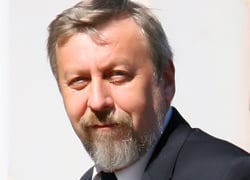“Nasha Niva”: Sannikov becomes a favourite
27- Andrei Dynko, “Nasha Niva”
- 4.10.2010, 13:38

Sannikov is not playing “a constructive opposition” – he is the most radical critic of Lukashenka.
Members of competing rival initiative groups admit: longest queues in Minsk emerge near campaign pickets of Andrei Sannikov, the leader of “European Belarus” civil campaign.
Sannikov has taken the first position in online polls protected from falsification.
At the same time, Sannikov managed to create the initiative group which is second according to its quantity among pre-democratic politicians.
What makes him so attractive? Is it explained by the fact that he is equally acceptable both for the West and for Russia, as Moscow mass media have clearly stated?
It seems that the initial reason is different.
Sannikov is the most radical critic of Lukashenka among all oppositional candidates. He does not play in “constructive opposition”. He does not passing by in silence Madame Percent-counter. He is persistently repeating that dictators could not be defeated in elections. Only the Square would show to the country that the nation does not stand behind the dictator, but is in favour of changes, which is the key moment for changing the system.
The peculiarity of this election, or if you like, of the national character is that even people who do not believe in elections and do not trust politicians, and for whom democracy is as welcome as water in their shoes, and who finally vote for Lukashenka, as everyone around does – even such Belarusians want Lukashenka to be brought to reason at least in words, so that there would be a spokesman for the great, existential hurt, which had been caused to Belarus by Lukashenka, and which is not redeemed by any economic growth. And Sannikov, biting Sannikov meets these expectations.
By the way, these people are not so stupid in their so seemingly narrow wish. Only presence of strongly articulated alternative could become an engine for positive changes.
Radicalism is always attractive at the stage of primaries, which in Belarusian situation is in fact collection of signatures.
However not only radicalism matters. Sannikov is a clear speaker. His style strongly contrasts with Milinkevich’s reserved approach. Sannikov does not fear conflicts. As activists think, he would have plenty to say during TV debates with Lukashenka.
Sannikov skillfully combines Belarusian patriotism with European prospects.
He has an informative biography: his grandfather worked for Kupala theatre; his wife was met at the barricades of struggle for independence; he had a right of signature in the talks on nuclear armaments. It makes him stand out among other center-right candidates, who have emerged like jacks-in-the-box.
Sannikov also reaps the fruits of skillful media work. He has created the most popular oppositional website, charter97.org, which is far from classical image of mass media. And now Sannikov has been supported by the most popular paper newspaper, “Narodnaya Volya”, and he has become its political analyst.
Sannikov has united a number of symbolic figures of independence movement around him: Shushkevich, Ivashkevich, Academician Haretski, “Zubr” movement leader Afnagel.
By no means unimportant in the structure of his support is that Sannikov violated many rules, calculatingly and intentionally – both the rules imposed by the dictatorship and those imposed by dissenters.
He has not created a party in the conditions when the dictatorship was tolerant to club parties of the opposition. He had not pushed for registration of his organization. He accumulated resources, when ethics demanded from dissenter groups to work in the conditions of permanent empty pockets. From the start “Charter’97” was not fascinated by pluralism, but moderated its forums harshly, in order to avoid manipulations of consciousness carried out by Lukashenka’s people at some other online resources. “Dictatorship could be defeated by adequate methods only,” many people think together with Sannikov.
It is doubtless that in the person of Sannikov the regime has one of the most experienced adversaries.
Can Sannikov become the single candidate of the opposition? It seems that the presence of “Tell the Truth!” campaign almost excludes such a chance.
However, the main thing would be not the number of signatures collected by this or that candidate, but sociology.
Nyaklyaeu has not been able to deprive Milinkevich of competitive edge considerably. If polls would show, and Russian TV channels would note Sannikov’s spurt, Sannikov could become a common denominator in absence of Milinkevich.
Andrei Dynko, “Nasha Niva”










